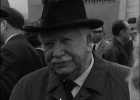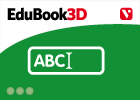Cargando...
Recursos educativos
-
Nivel educativo
-
Competencias
-
Tipología
-
Idioma
-
Tipo de medio
-
Tipo de actividad
-
Destinatarios
-
Tipo de audiencia
-
Creador
-

Society in the 21st century
EduBook Organización
- 2007 visitas
6.1. A time of change In today's industrialised world, the rural farming population has almost completely disappeared. It now represents just 4.4 % of the working population. Moreover, the working…
-

Final self-evaluation 01 - Living things
EduBook Organización
- 1996 visitas
Decide if the following statements are true or false: Living things are different from non-living things because they have vital functions. ➝ Living things are active. ➝ Trees are living things. ➝…
-

Interpret. Evolution of the United Nations
EduBook Organización
- 1983 visitas
Look at the graph about the growth of the UN and do the activities: When was the UN created? How many countries signed the founding charter of the UN? How many countries made up the United Nations in…
-

Immigration in Spain
EduBook Organización
- 1959 visitas
5.1. Immigration today Towards the end of the 20th century, Spain became a receiving country as the number of immigrants increased significantly. Immigrants were attracted by the growing job market in…
-

The end of Francoism
EduBook Organización
- 1927 visitas
6.1. The economic crisis of the 1970s In 1973, the economies of the Western countries began to weaken, due to a sudden rise in the price of oil and raw materials. The oil crisis that followed brought an…
-

The 18th century: the Ancien Régime in crisis
Carlos Morales Docente
- 1 lo usan
- 483 visitas
In the early 18th century, the Ancien Régime was the dominant political and social system in Europe. It was made up of an absolute monarchy, a social structure based on the estates of the realm and a…
-

The history of the European Union
Núria Termes Organización
- 722 visitas
The Founding Fathers of the EU 1945 - 1959: A peaceful Europe – the beginnings of cooperation 1960 - 1969: A period of economic growth 1970 - 1979: A growing Community – the first enlargement 1980 -…
-

Absolute Monarchy: The Catholic Monarchs
EduBook Organización
- 21675 visitas
The 15th century marked the end of the Middle Ages and the beginning of the Modern Age. The Modern Age saw economic and population growth. There was also an increase in artisan activity and the…
-

Complete. The 18th century
EduBook Organización
- 4 lo usan
- 8219 visitas
Complete the sentences about the 18th century and the crisis of the Ancien Régime with the missing words: During the 18th century, Europe maintained the characteristics of the Ancien Régime: absolute…
-

Final self-evaluation 11.01 - The Earth's Population
EduBook Organización
- 7284 visitas
Are the following statements true or false?: Population growth depends on the birth rate and the mortality rate being equal. The global population grew slowly until the middle of the 17th century and…
Te estamos redirigiendo a la ficha del libro...













